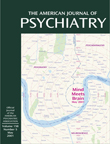Association of Short-Term Response to Haloperidol Treatment With a Polymorphism in the Dopamine D2 Receptor Gene
Abstract
OBJECTIVE: Pharmacogenetic influences on therapeutic response to neuroleptic treatment are poorly understood. This study investigates the association of response to short-term haloperidol treatment with a Taq I polymorphism in the DRD2 gene. METHOD: Fifty-seven patients with acute psychosis were treated with haloperidol for up to 28 days. Improvement and response were measured by using the Positive and Negative Syndrome Scale. Forty-one patients were homozygous for allele 2, and 16 were heterozygous. RESULTS: Heterozygous patients showed a greater improvement in positive, but not in negative, symptoms on all treatment days than patients homozygous for allele 2. Differences in improvement of positive symptoms reached statistical significance on days 14, 21, and 28. On treatment day 14, 10 (62.5%) of 16 heterozygous patients had at least 50% improvement of positive symptoms, compared with 11 (28.9%) of 38 homozygous patients. CONCLUSIONS: These results support the hypothesis that genetic variations in the DRD2 gene may influence the individual response to antipsychotics.



